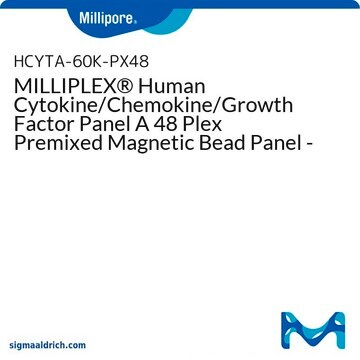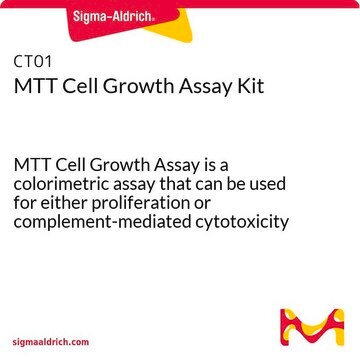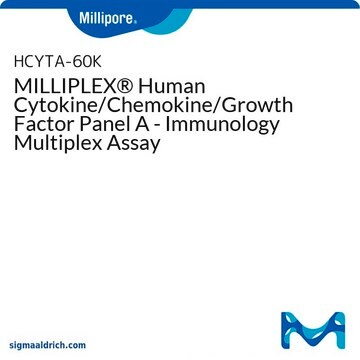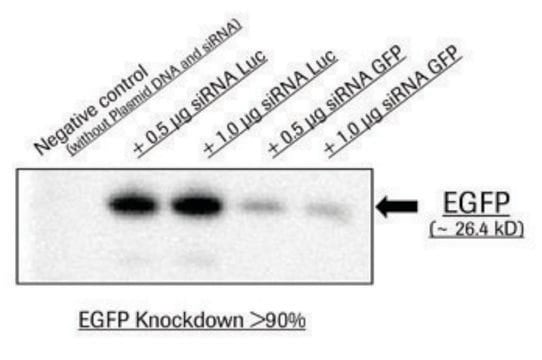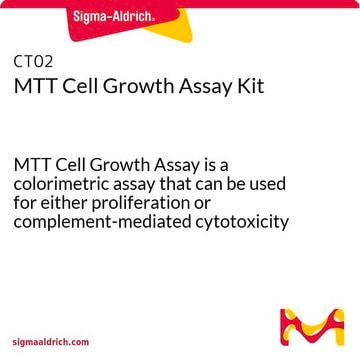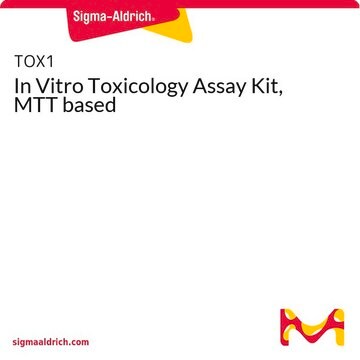CELLPRO-RO
Roche
Cell Proliferation Reagent WST-1
suitable for protein quantification, suitable for cell analysis, detection, solution
Synonym(s):
cell proliferation reagent, wst-1
About This Item
Recommended Products
form
solution
Quality Level
usage
sufficient for ≤2,500 tests (11644807001)
sufficient for ≤800 tests (05015944001)
packaging
bottle of 25 mL (11644807001)
bottle of 8 mL (05015944001)
manufacturer/tradename
Roche
storage condition
protect from light
technique(s)
protein quantification: suitable
optimum pH
8.0(for physiological conditions our product is buffered pH 7.3)
λmax
440-480 nm
application(s)
cell analysis
detection
detection method
colorimetric
storage temp.
−20°C
General description
Ready-to-use solution, containing WST-1 and an electron coupling reagent.
Application
- Analysis of cytotoxic and cytostatic compounds, such as anti-cancer drugs and other pharmaceutical compounds
- Assessment of growth inhibitory antibodies and physiological mediators
Features and Benefits
- Convenient: Benefit from a ready-to-use reagent.
- Safe and Easy: Eliminate radioactive isotopes, washing steps, and additional reagents.
- Accurate: The absorbance obtained strongly correlates to the cell number.
- Sensitive: Detect low cell numbers.
- Fast: Process a large number of samples using a multi-well ELISA reader.
Principle
Cells grown in a 96-well tissue culture plate are incubated with the WST-1 reagent for 0.5 - 4 hours. After this incubation period, the formazan dye formed is quantitated with a scanning multi-well spectrophotometer (ELISA reader). The measured absorbance directly correlates to the number of viable cells.
Cell proliferation and viability assays are of particular importance for routine applications in cell biology. Tetrazolium salts (e.g., MTT, XTT, WST-1) are particularly useful for this type of analysis. Tetrazolium salts are cleaved to formazan by the succinate-tetrazolium reductase system (EC 1.3.99.1) which belongs to the respiratory chain of the mitochondria, and is only active in metabolically intact cells.
Preparation Note
Using the 100 μl/well cell culture volume, one vial will be sufficient to perform 2500 tests (25 microplates).
Note: If the cells are cultured in 200 μl/well, add 20 μl/well Cell Proliferation Reagent WST-1.
Storage conditions (working solution): 2 to 8 °C
Note: When precipitates or turbidity are observed upon thawing, warm up the solution to 37 °C for 2 to 10 minutes and agitate to dissolve the precipitates.Centrifugation is not recommended because the working concentration would decrease. After being dissolved, the WST-1 reagent can be used without any limitations. Please store as follows:
Once thawed, store at 2 to 8 °C, protected from light, for up to four weeks. However please note that the solution may become viscous. If so, warm up the solution to 37 °C for 2 to 10 minutes as described above.
Long storage
For long storage, aliquots of WST-1 can be stored in plastic tubes at -15 to -25 °C until the expiry date.
Other Notes
related product
Storage Class Code
12 - Non Combustible Liquids
WGK
nwg
Flash Point(F)
No data available
Flash Point(C)
No data available
Choose from one of the most recent versions:
Already Own This Product?
Find documentation for the products that you have recently purchased in the Document Library.
Customers Also Viewed
Articles
Cell based assays for cell proliferation (BrdU, MTT, WST1), cell viability and cytotoxicity experiments for applications in cancer, neuroscience and stem cell research.
Protocols
WST-1 assay protocol for cell viability and cytotoxicity measurements with preparation instructions, applications, FAQs, and troubleshooting.
Our team of scientists has experience in all areas of research including Life Science, Material Science, Chemical Synthesis, Chromatography, Analytical and many others.
Contact Technical Service

